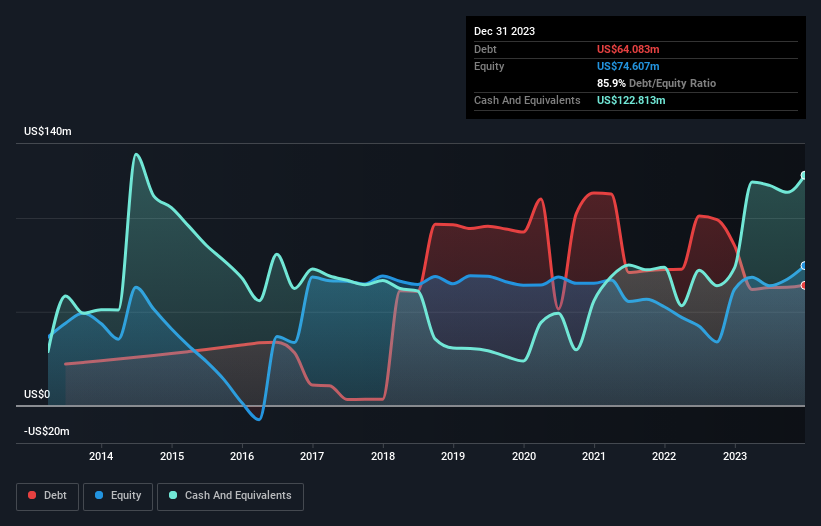Legendary fund manager Li Lu (who Charlie Munger backed) once said, 'The biggest investment risk is not the volatility of prices, but whether you will suffer a permanent loss of capital.' When we think about how risky a company is, we always like to look at its use of debt, since debt overload can lead to ruin. We note that Great Elm Group, Inc. (NASDAQ:GEG) does have debt on its balance sheet. But is this debt a concern to shareholders?
When Is Debt A Problem?
Debt and other liabilities become risky for a business when it cannot easily fulfill those obligations, either with free cash flow or by raising capital at an attractive price. In the worst case scenario, a company can go bankrupt if it cannot pay its creditors. However, a more usual (but still expensive) situation is where a company must dilute shareholders at a cheap share price simply to get debt under control. Having said that, the most common situation is where a company manages its debt reasonably well - and to its own advantage. When we think about a company's use of debt, we first look at cash and debt together.
View our latest analysis for Great Elm Group
How Much Debt Does Great Elm Group Carry?
You can click the graphic below for the historical numbers, but it shows that Great Elm Group had US$64.1m of debt in December 2023, down from US$85.2m, one year before. However, its balance sheet shows it holds US$122.8m in cash, so it actually has US$58.7m net cash.

A Look At Great Elm Group's Liabilities
The latest balance sheet data shows that Great Elm Group had liabilities of US$6.88m due within a year, and liabilities of US$64.7m falling due after that. On the other hand, it had cash of US$122.8m and US$3.49m worth of receivables due within a year. So it actually has US$54.7m more liquid assets than total liabilities.
This luscious liquidity implies that Great Elm Group's balance sheet is sturdy like a giant sequoia tree. On this view, lenders should feel as safe as the beloved of a black-belt karate master. Succinctly put, Great Elm Group boasts net cash, so it's fair to say it does not have a heavy debt load! When analysing debt levels, the balance sheet is the obvious place to start. But it is Great Elm Group's earnings that will influence how the balance sheet holds up in the future. So if you're keen to discover more about its earnings, it might be worth checking out this graph of its long term earnings trend.
Over 12 months, Great Elm Group reported revenue of US$11m, which is a gain of 77%, although it did not report any earnings before interest and tax. With any luck the company will be able to grow its way to profitability.
So How Risky Is Great Elm Group?
While Great Elm Group lost money on an earnings before interest and tax (EBIT) level, it actually generated positive free cash flow US$40m. So taking that on face value, and considering the net cash situation, we don't think that the stock is too risky in the near term. Given it also grew revenue by 77% over the last year, we think there's a good chance the company is on track. That growth could mean this is one stock well worth watching. When analysing debt levels, the balance sheet is the obvious place to start. But ultimately, every company can contain risks that exist outside of the balance sheet. We've identified 2 warning signs with Great Elm Group , and understanding them should be part of your investment process.
If you're interested in investing in businesses that can grow profits without the burden of debt, then check out this free list of growing businesses that have net cash on the balance sheet.
New: Manage All Your Stock Portfolios in One Place
We've created the ultimate portfolio companion for stock investors, and it's free.
• Connect an unlimited number of Portfolios and see your total in one currency
• Be alerted to new Warning Signs or Risks via email or mobile
• Track the Fair Value of your stocks
Have feedback on this article? Concerned about the content? Get in touch with us directly. Alternatively, email editorial-team (at) simplywallst.com.
This article by Simply Wall St is general in nature. We provide commentary based on historical data and analyst forecasts only using an unbiased methodology and our articles are not intended to be financial advice. It does not constitute a recommendation to buy or sell any stock, and does not take account of your objectives, or your financial situation. We aim to bring you long-term focused analysis driven by fundamental data. Note that our analysis may not factor in the latest price-sensitive company announcements or qualitative material. Simply Wall St has no position in any stocks mentioned.
About NasdaqGS:GEG
Great Elm Group
An asset management company, focuses on the credit, real estate, specialty finance, and other alternative strategies businesses.
Mediocre balance sheet and slightly overvalued.
Similar Companies
Market Insights
Community Narratives



